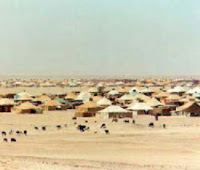 20 March 2007, 5:53 PM
20 March 2007, 5:53 PMBy Natasha Maguder
How much do you know about Western Sahara? Is it a country? A territory? A place in conflict? Western Sahara is one of those corners of the world which we hear very little about. I heard about it originally from a passionate lecturer at my university in Leeds, then through friends with shared interests in London.
When you read into the history of the area, the story grabs you. The region is at an impasse. As it stands it's gone through sixteen years of war with Morocco, followed by sixteen years of limbo. It's locked in the aftermath of a ceasefire and UN resolutions which never quite came off, despite the efforts of many top diplomats. Some argue that those sixteen years of waiting have been more debilitating for the Saharawi people than the sixteen years of combat.
How do you report on a story which is full of political twists and turns, and complicated to say the least, without filling a report with too many facts and figures, and confusing the listener? Often the stories you're most interested in can be the hardest to cover, because you want to squeeze in every last detail.
The people of the Western Sahara feel that one of the best ways of expressing themselves is through spreading their culture. So when I heard that the charity Sandblast had invited Saharawi singer Aziza Brahim over to the UK, it was a great opportunity to tell the story in their own unique way.
 Saharawis think of culture as their weapon. They believe in perpetuating their identity and beliefs through their artistic work. Their culture is more than integral to their identity, it is their identity, according to Aziza, who came into Channel 4 News and gave an interview to the Morning Report (listen to the MP3 here).
Saharawis think of culture as their weapon. They believe in perpetuating their identity and beliefs through their artistic work. Their culture is more than integral to their identity, it is their identity, according to Aziza, who came into Channel 4 News and gave an interview to the Morning Report (listen to the MP3 here).Identity is everything to the people stuck in the refugee camps outside Tindouf in Algeria, and the exiled government who also operate from within their neighbour's borders. The Saharawi Arab Democratic Republic remains staunch in its defence of Western Sahara, an area it believes is under occupation by Morocco. It continues to try to work with the UN and the African Union, of which it was a founding member, to resolve a deadlock which has proven hard to break.
Saharawi representatives work tirelessly to generate support and momentum for their struggle. Despite being born in a refugee camp and having undergone her own hardships, Aziza is here in the UK building relationships with other cultures, and exchanging ideas and creativity with strangers. She came to us from the SADR's Ministry of Culture. It seems a novel way to negotiate; with song, art, photography and poetry.
Morocco believes the area known as Western Sahara belongs to it. But the West needs all the allies it can get in the muslim world, so it has been slow to put pressure on Morocco to put the wheels in motion for self determination for the Saharawi people. The Saharawi's plight is still relatively little known around the world - and with greater awareness, they may be able to rouse more international support for their cause. Even Aziza singing her native songs in a little radio studio in London has meant the story has already fallen on new ears.
http://www.channel4.com/blogs/page/newsroom?entry=singing_for_freedom_in_a

No hay comentarios:
Publicar un comentario